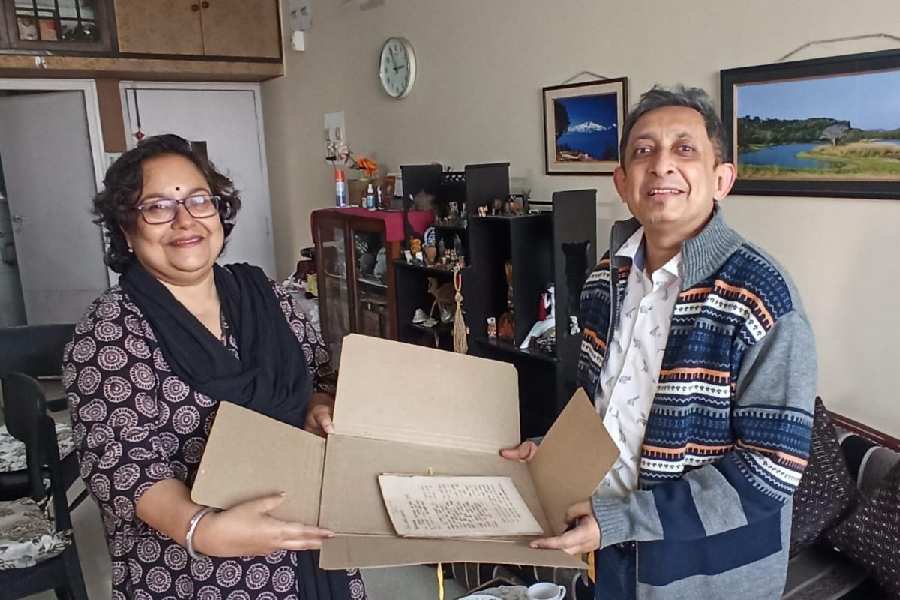JU school turns 20, adds Parashuram to archive


Seven manuscripts of Parashuram were added to a stellar repository of Bengal’s cultural heritage, the School of Cultural Texts and Records (SCTR), at Jadavpur University on Tuesday.
These included stories like Anondibai and Tilottama, which were contributed by the great humorist Rajsekhar Basu under his pen name to the feature section of the newspaper Jugantar, then edited by Parimal Goswami.
It was a special occasion on which the handover took place — the 20th anniversary of the school which was set up at a time when the term interdisciplinary studies was little known in India.
“We were on the lookout for a place that would ensure safe-keeping of the manuscripts and also allow researchers to access them. (Poet) Sankha (Ghosh) babu had told us about this school. When I heard they were turning 20, I thought this was an apt occasion to make the gift,” Haimanti Banerjee, Goswami’s granddaughter, told Metro.
Sprightly at 88, hockey legend Gurbux Singh was present at the auditorium where the anniversary was celebrated on Tuesday. “I am keeping a diary since I started playing. It would have gone to waste. It is fortunate for me that SCTR is doing this wonderful job,” said the Olympian, who has attended the Games six times as player, coach, commentator and columnist.
Parashuram and Gurbax Singh’s manuscripts join other notable items in the SCTR collection — poet Sudhindranath and musicologist Rajeshwari Dutta and Sakti Chattopadhyay, shooting scripts of 20 Tapan Sinha films, filmmaker Dinen Gupta’s scripts and music recordings, historian Ramesh Majumdar’s papers, poet Bijoya and Sarat Kumar Muhopadhyay manuscripts etc. Digital archives are even more impressive, comprising 91 volumes of poet Buddhadeva Bose, including many unpublished texts and his own English translations of his works, Badal Sircar’s drama manuscripts, including radio and Hindi versions of his plays, and singer Suchitra Mitra’s papers, to name a few.
JU registrar Snehamanju Basu enlisted the achievements of the school that was described by Research Councils UK, as a “striking case” of a “centre of excellence” that “grew out of faculty research and consequent archiving needs” in its report on arts and humanities research mapping in India.
“The school is a dynamic one. From 2011, it is enrolling doctoral students for research, and offering a certified course in editing and publishing, a post-graduate diploma course in digital humanities and cultural informatics and a course in music appreciation,” she added.
The most remarkable achievement of the school in recent times has been creation of a complete online variorum edition of Rabindranath Tagore’s works in Bengali and English. Bichitra. Edited by Sukanta Chaudhuri, it is the world’s biggest integrated website of primary documents relating to a single author.
Chaudhuri, the SCTR founder-director, recalled serendipitious circumstances that favoured the project. “When the central government announced generous grants for Tagore’s 150th birth anniversary, we realised this was our chance. I contacted Rabindra Bhavan as no work on Tagore can be completed without their help. Their executive council’s annual meeting, it turned out, was the week after and I was asked to attend it. The vice-chancellor Rajatkanta Roy was ill but called us to his bedside to give his assent.” It is after this that he approached the JU authorities for permission, which the then VC Pradip Narayan Ghosh granted.
He also spoke of a more ambitious project that the school has undertaken — an online historical dictionary, Sabdakalpa, that would trace the evolution of every word in Bengali. “Work is progressing and the software is ready. Something of similar scale has been achieved only for English and Dutch.”
With conventional funding sources drying up, both he and the current SCTR director Abhijit Gupta thanked the Global JU Alumni Foundation and appealed for financial help to complete the project and keep the school running.